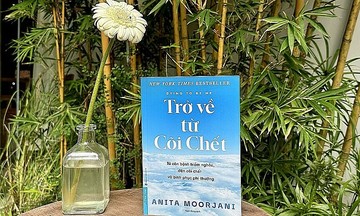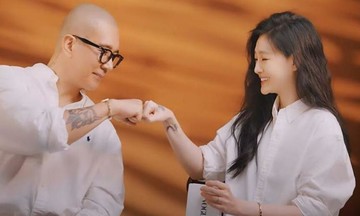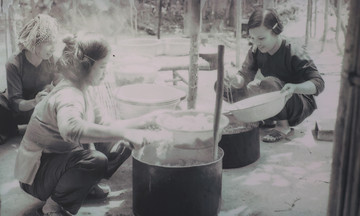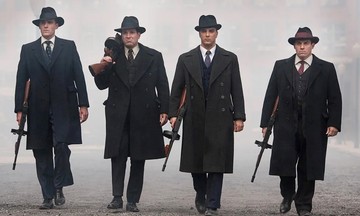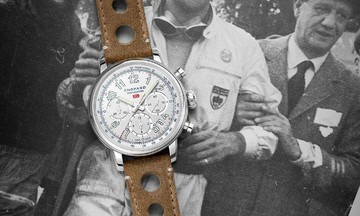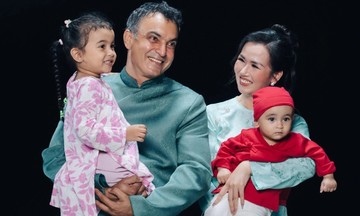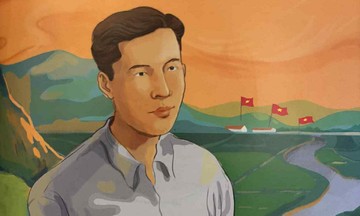As "Red Rain" becomes the highest-grossing domestic film in history, exceeding all box office records with over 552 billion VND, the director shares her thoughts and memories from the filmmaking process.
- How do you feel about "Red Rain" continually breaking records, making you the first female director with a film earning over 500 billion VND?
- Not just me, but everyone at the People's Army Cinema and the entire crew are overjoyed. I am a soldier serving in the armed forces' film unit. "Red Rain" was a political task assigned to the People's Army Cinema by our superiors, so we weren't overly concerned with revenue. We were more interested in the number of moviegoers—over 7 million—which we consider the greatest reward. This is the result of the collective effort. During the more than three years pursuing this project, we treated it as a campaign, a battle. Each person was a soldier eager to complete their mission to the highest degree.
Personally, I knew many prominent directors were considered to helm "Red Rain." Entrusting such a large-scale war film to a female director raised some concerns. However, I ultimately received the trust and support of the leadership. Therefore, I'm happy I didn't disappoint their faith in me.
* Director Dang Thai Huyen discusses the film "Red Rain"
- What do you think allowed the film to transcend the label of a "state-sponsored film" and resonate strongly with the market?
- I believe the issue isn't whether a film is state-sponsored or privately produced but whether it receives adequate investment. A successful film must meet fundamental criteria: a good script, meticulous investment, and a dedicated, hardworking crew. With these conditions met, I believe any film, regardless of its commercial or political purpose, can touch the audience's hearts.
"Red Rain" has made a small statement in reaffirming the position of war and revolution films: it's time for this genre to have a place in the development of modern Vietnamese cinema. This success also encourages filmmakers, producers, and investors interested in pursuing this theme.
I don't think we should compare it to previous high-grossing films by other directors. Each genre has its mission, and every successful film contributes to the overall development of Vietnamese cinema.
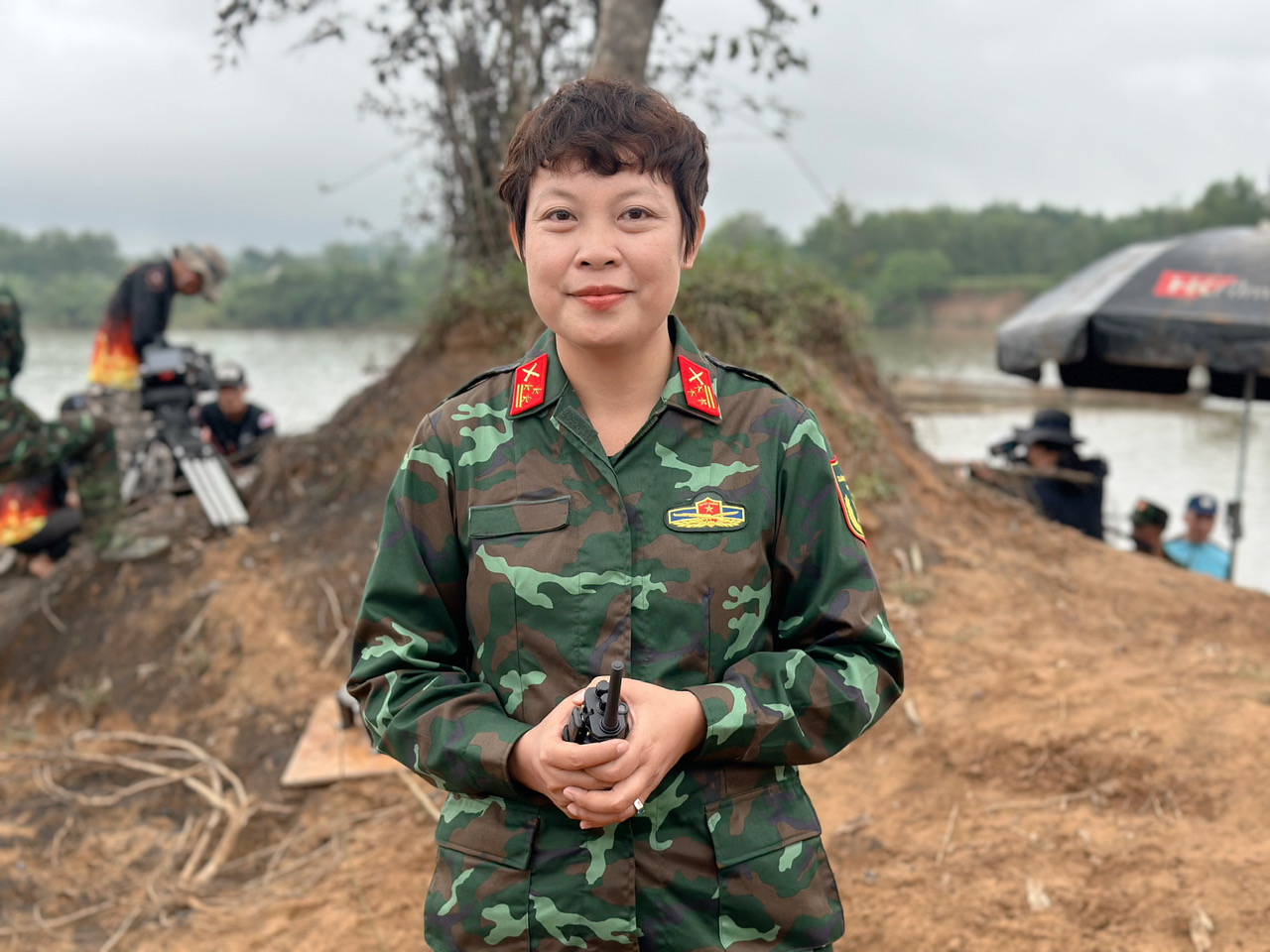 |
Director Dang Thai Huyen on the set of "Red Rain." Photo: Ha Thu |
Director Dang Thai Huyen on the set of "Red Rain." Photo: Ha Thu
- Over a year of pre-production, 81 days of filming, six months of editing – which phase was the most challenging?
90% of the film was shot outdoors, at the exact location of the historical battle. Stepping onto the set always evoked strong emotions as we felt the past and present merge, transporting us back to 1972. This atmosphere made everyone more reverent during each shot. However, the weather in Quang Tri during that period was freezing and harsh. There were days when the crew worked through the night, and everyone experienced health issues.
I once fainted at the hotel and woke up quite disoriented. I encouraged myself to persevere and not reveal my declining health because almost every shooting day was intense with large-scale scenes. Every department required utmost concentration. If the director's spirit and performance wavered, it would affect the entire team. On set, I always maintained my enthusiasm and only allowed myself to release my exhaustion when I returned to my room.
Post-production presented a mental challenge to create the best possible film. I also faced time pressure. After filming finished before the Lunar New Year, I rested for a few days and then plunged back into work. When the film was complete, from sound mixing and special effects to color correction, we were only 10 days away from the release date. Afterward, my eyes felt blurry, and my ears were ringing from the constant sound of explosions. This was truly an exhausting period, both mentally and physically. Completing "Red Rain" felt like I had poured my heart and soul into every frame.
- The film also touches upon national reconciliation through the two male leads on opposing sides. What are your thoughts on incorporating this into a domestic film?
- Some viewers commented on the significant disparity between the opposing side and the liberation soldiers in terms of troop strength, weaponry, and physique. The "Red Rain" team strived for a neutral perspective to observe the issue fairly and portray it in the film. In reality, overcoming a stronger opponent makes victory more meaningful.
Ly Thai Dung, the director of photography, once said something profound: "If we forget a war, we may repeat it in the future. But if we can't forget, we'll live in hatred forever." We often discussed this throughout the filmmaking process. I believe "Red Rain" offers a respectful and humane perspective on what to forget and what to remember. In peacetime, we should strive for closure and national reconciliation. The country's development partly depends on the unity of all regions and groups. The film contributes a small voice to this message, and we will continue to address it in future projects.
Music video "Pain Amidst Peace," from the "Red Rain" soundtrack. Video: Provided by the film crew
- You mentioned crying when you first read the script over 10 years ago. Which details resonated with you then?
- Many descriptions in the original script by the writer were intense, leaving me heartbroken after reading. He depicted the soldiers' deaths as tragic, heroic, and deeply sorrowful. In the scene of sacrifice on the river, the image of the soldier sinking beneath the surface, calling out "Mother," haunted me.
However, I couldn't include everything from the script in the film. Firstly, I wanted the film to reach a wide audience, especially young people. If I followed the script exactly, I don't think even adults could bear it, let alone teenagers. I didn't want to exhaust them mentally for two hours. That's not my style of war filmmaking.
For me, a film needs its own artistic interpretation, not a mere replication of the script. A powerful war film isn't solely about large-scale scenes. I invested in small moments, depicting the chilling silences on the battlefield. Sometimes, these segments were more challenging and complex than the battle scenes. I think that's Dang Thai Huyen's signature style. I'm grateful to director of photography Ly Thai Dung and production designer Vu Viet Hung for understanding and helping create visuals that captured this spirit.
- Films inspired by historical events can spark reactions or comparisons regarding accuracy and authenticity. What considerations did you make when using real-life details?
We received praise and criticism, all constructive. The film crew and I appreciate the audience's observations, feedback, and attention. These comments provide valuable material for our next project.
For instance, many veterans said the film only portrayed a fraction of their experiences, not as intense as reality. During filming, we consulted numerous documents about the citadel battle recorded by war correspondents and listened to firsthand accounts. However, we intended the film to be a fictional narrative with imaginative elements. The crucial aspect is that the film inspires viewers to experience glimpses of the war and history, motivating them to learn more about the 81-day battle of Quang Tri and related events.
After "Red Rain's" release, when we held a tribute screening in Quang Tri, the monument management reported a surge in visitors. The "Red Rain" novel also became a bestseller. I believe the film has fulfilled its mission of evoking gratitude and pride.
- Viewers felt the portrayal of the two female characters at the negotiating table wasn't entirely convincing as former Vice President Nguyen Thi Binh. What are your thoughts?
Madam Nguyen Thi Binh is my idol. Her diplomatic demeanor is unique and impossible to replicate fully. Many viewers, after watching the film, commented that Thuy Ha and Yen Nhi didn't capture her essence, suggesting other actresses would have been more suitable. However, all characters in the film are fictional; no actress was portraying Madam Binh.
The actresses' costumes and styling were inspired by Madam Binh's image. As it's a fictionalized account, having two women at the negotiating table instead of one, as in reality, doesn't carry any special meaning. We aimed to convey the tension between the battlefield at the citadel and the diplomatic front.
- In a major project like "Red Rain," why did you primarily choose new, young faces?
For the cast, I held auditions in both the north and south. As with previous projects, I didn't seek established stars but focused on fresh faces. I believe young, relatively unknown actors are like a breath of fresh air, making it easier for audiences to believe in their performances. Viewers can see Binh, Ta, and Sen as if they stepped out of the past, vibrant and real. I'm satisfied with the actors' dedication and commitment to every scene.
Before filming began, the cast spent six months immersed in the script. After receiving their roles, they lived like soldiers at a military base in Cu Chi (TP HCM), training with martial arts and combat instructors. During this time, the assistant director ensured they thoroughly read the script and rehearsed their lines together. As the set neared completion, we introduced the actors to the environment and had 15 days of test shoots for crucial scenes. So, after about six months, they practically became real soldiers. This was a meticulous, lengthy, and costly preparation process.
- Which scene did you consider impossible, but the team managed to achieve?
The large-scale scenes on the river. Director of photography Ly Thai Dung and I often remarked that even major international studios rarely risk filming such extensive scenes with real explosions on a river. They mostly use studio sets with artificial river sections or controlled water tanks for safety. On the Thach Han River, everything was complex, from set design and construction to production. But we ultimately succeeded.
People often ask me, "If you could do it again, what would you change?" During post-production, I had multiple edits. After completing each version, I'd sit alone in the screening room and contemplate, "If I were the audience, how would I perceive this story?" The final product represents the best and most satisfying footage, leaving me with no regrets.
- What are your plans after "Red Rain?"
War and revolution films are the primary focus of the People's Army Cinema and me. I believe this is a golden age, as audiences increasingly appreciate significant national events and related works like films, art programs, and songs. This is encouraging and motivates artists. Ultimately, all creative works serve the people.
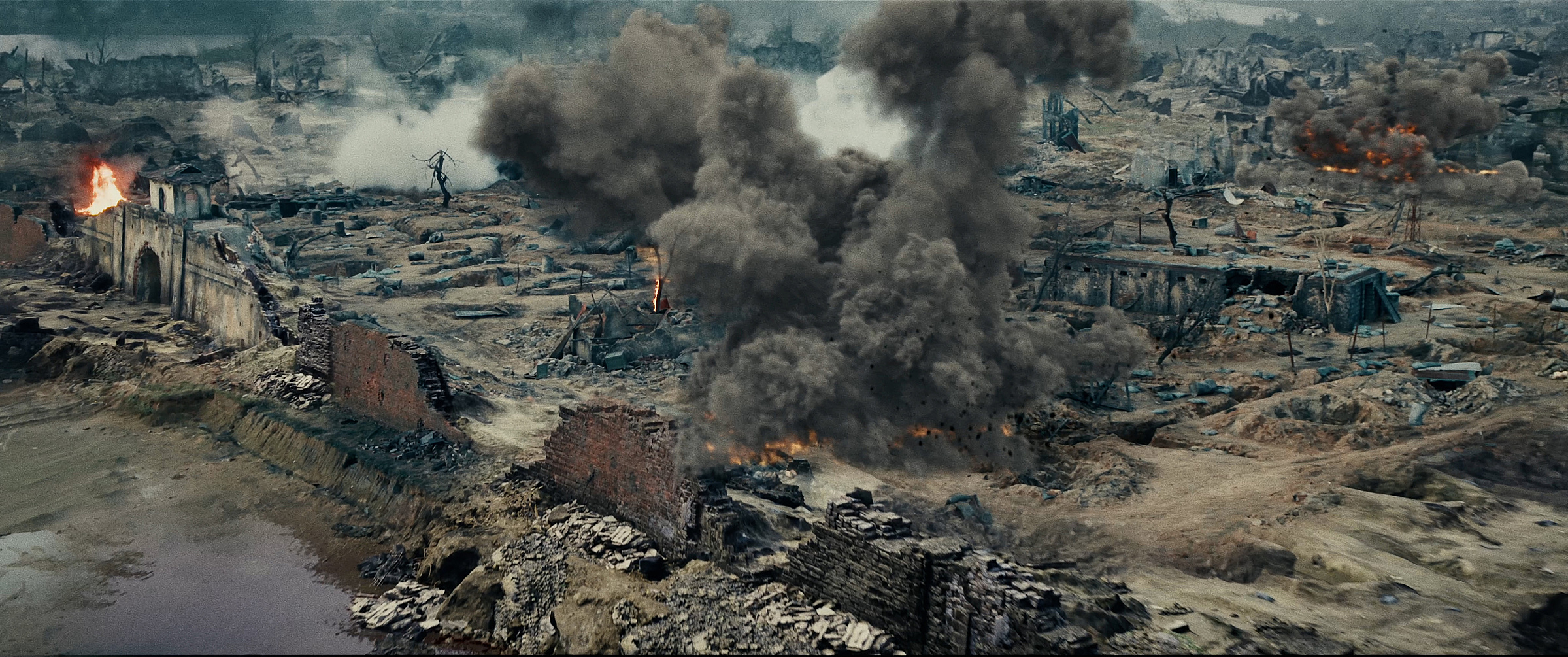 |
Part of the "Red Rain" film set in Quang Tri. Photo: Provided by the film crew |
Part of the "Red Rain" film set in Quang Tri. Photo: Provided by the film crew
Director Dang Thai Huyen, 45, graduated top of her class (19th intake) in Directing from the Hanoi University of Theatre and Cinema and holds a Master's degree in Film and Television Arts. She is currently the Deputy Director in charge of Arts at the People's Army Cinema.
She directed "Thirteen River Docks," adapted from the short story "Suong Nguyet Minh," which won six awards at the 16th Vietnam Film Festival, including the Golden Lotus and Best Director awards. Her other films include "The Returnee" and "The Family Curse." She was awarded the title of Meritorious Artist in 2024.
Ha Thu




